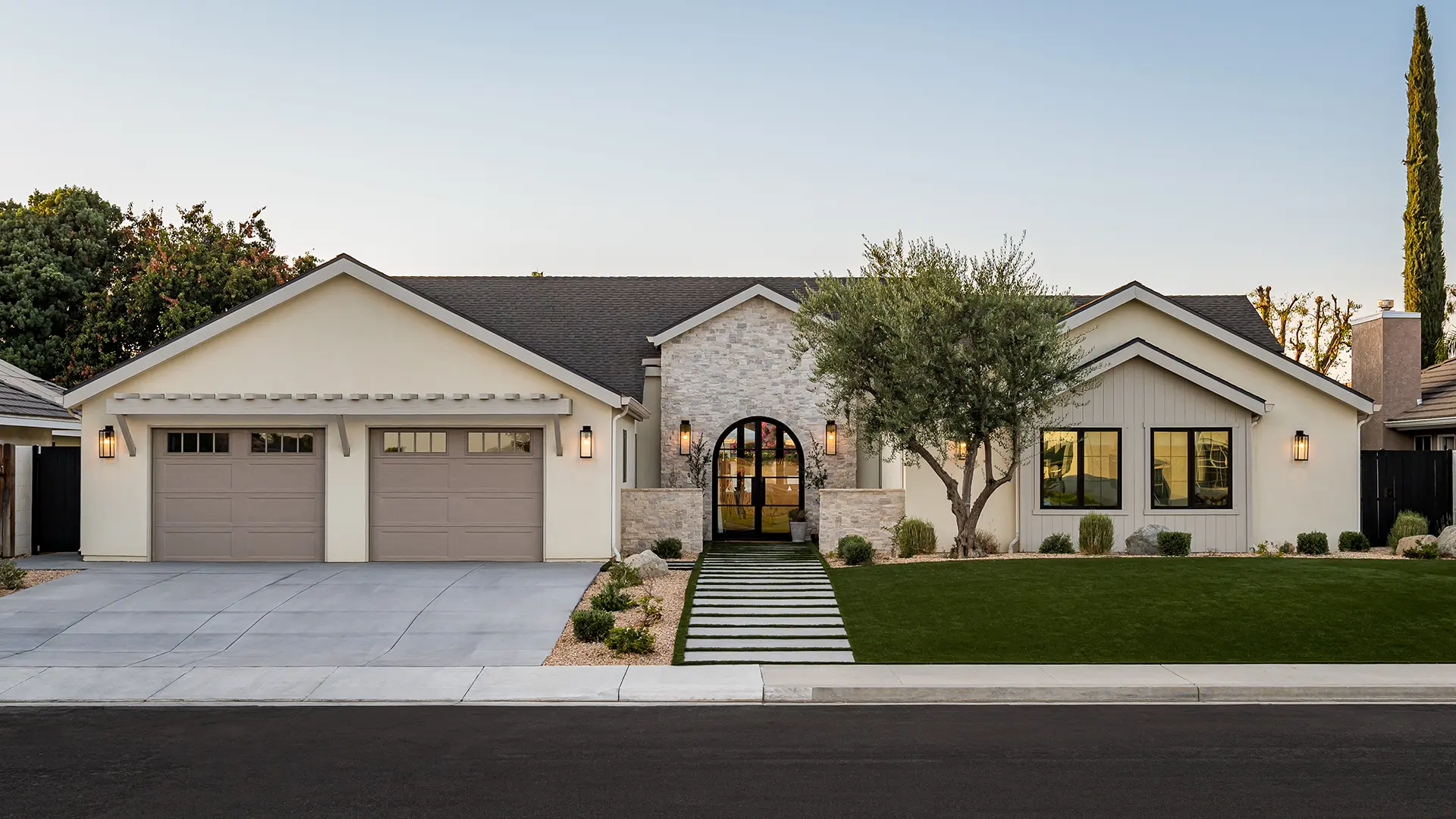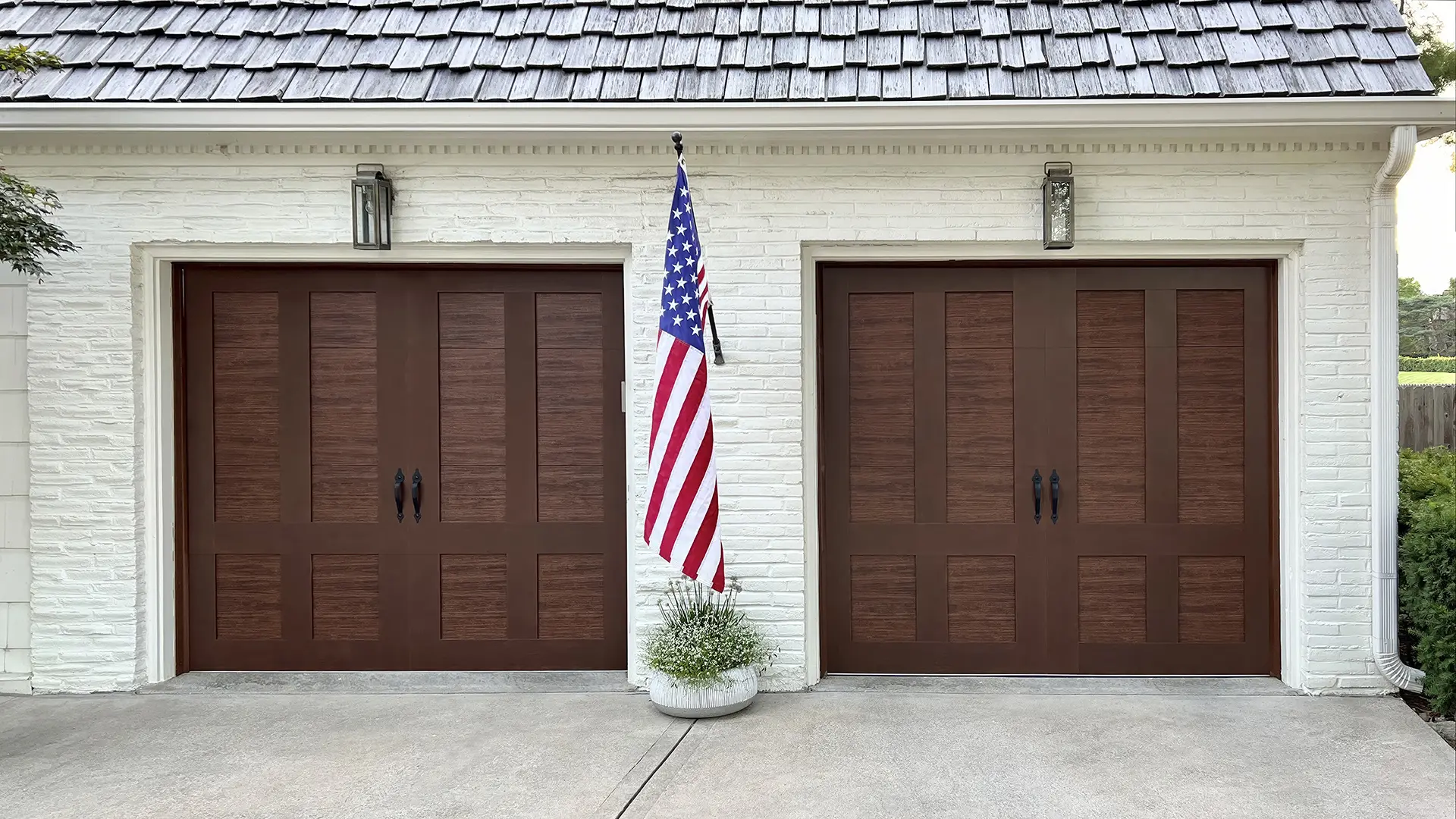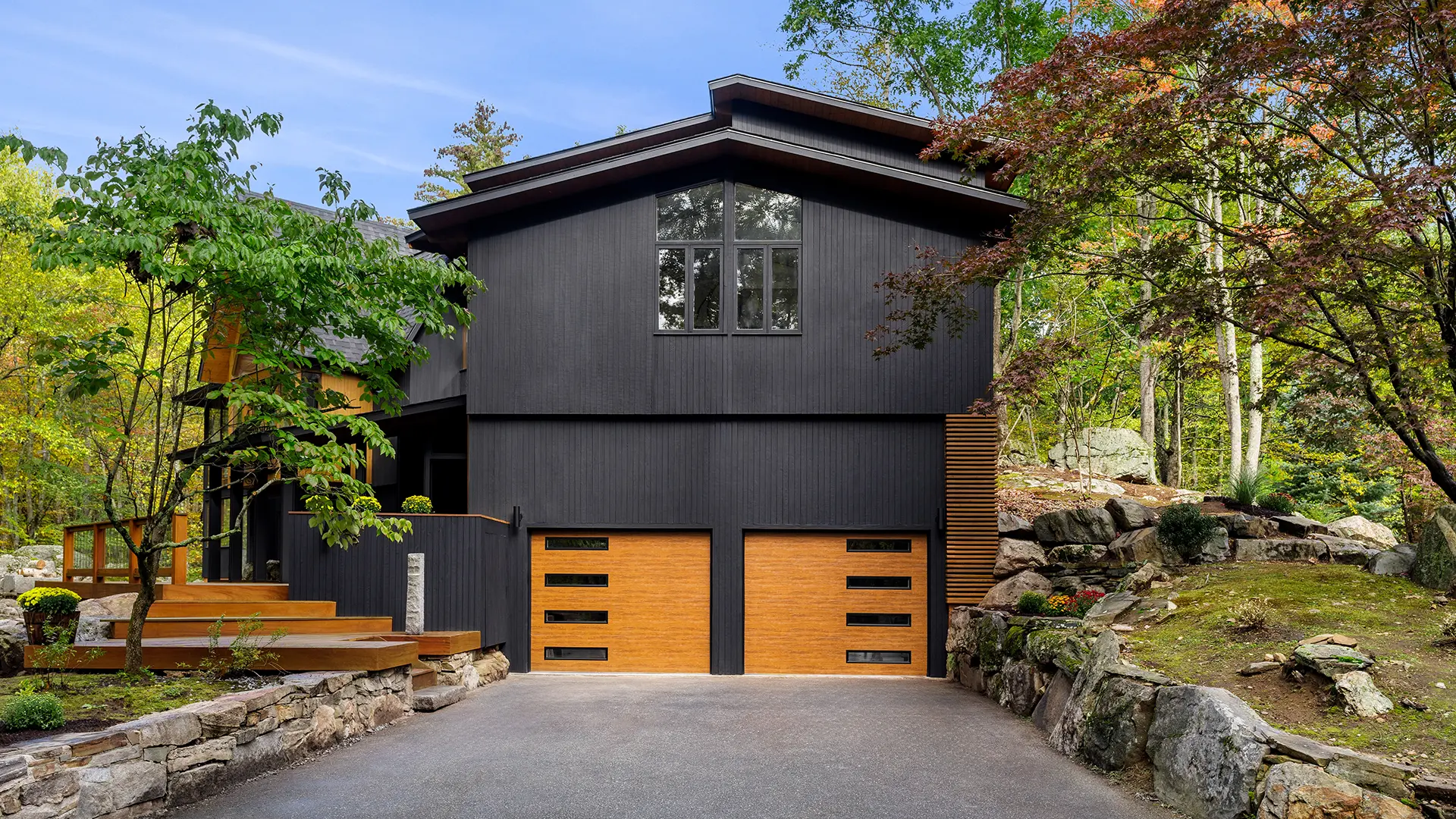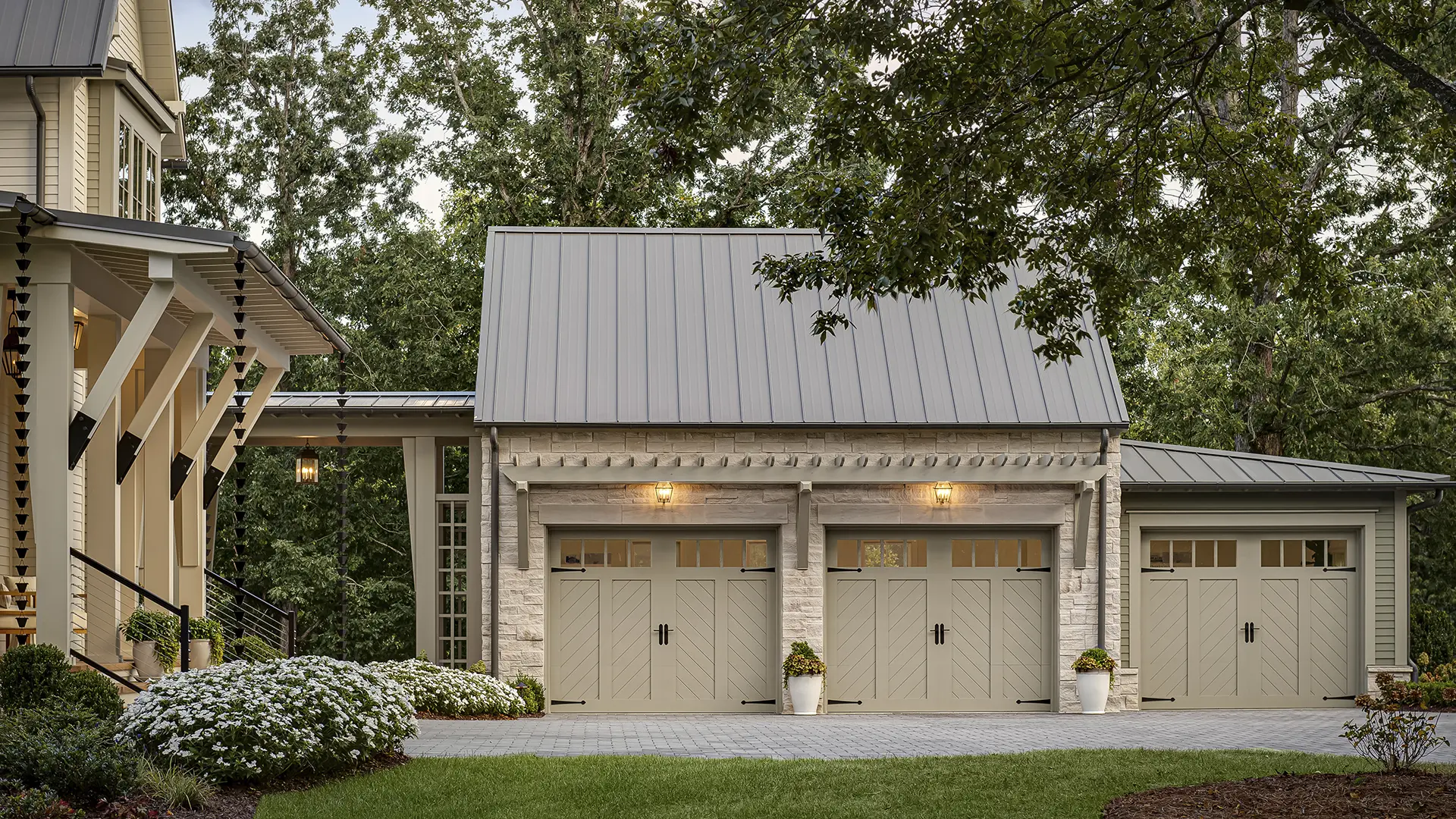Choosing the best garage door materials can impact everything from energy bills to long-term upkeep, especially when you factor in the climate where you live. Cold winters, humid summers, or dry heat—all of these conditions can affect how a garage door performs over time. When weighing the options, it’s smart to consider how each material stacks up in terms of insulation, durability, maintenance, and overall cost.
Here we’ll give you a garage door material comparison, breaking down the pros and cons of popular options. Whether you’re searching for the best garage door for cold climates, the best garage door for warm climates, or simply want to know what you can afford, we’re here to help you make a decision that fits your home and your budget.
Steel Garage Doors
Steel garage doors are made from layers of galvanized steel, often finished with a protective coating and sometimes insulated with polystyrene or polyurethane for added energy efficiency. They come in a range of gauges—thicker steel means greater durability—and are available in single-, double-, or even triple-layer construction. This versatility makes steel a go-to option for both traditional and modern homes.
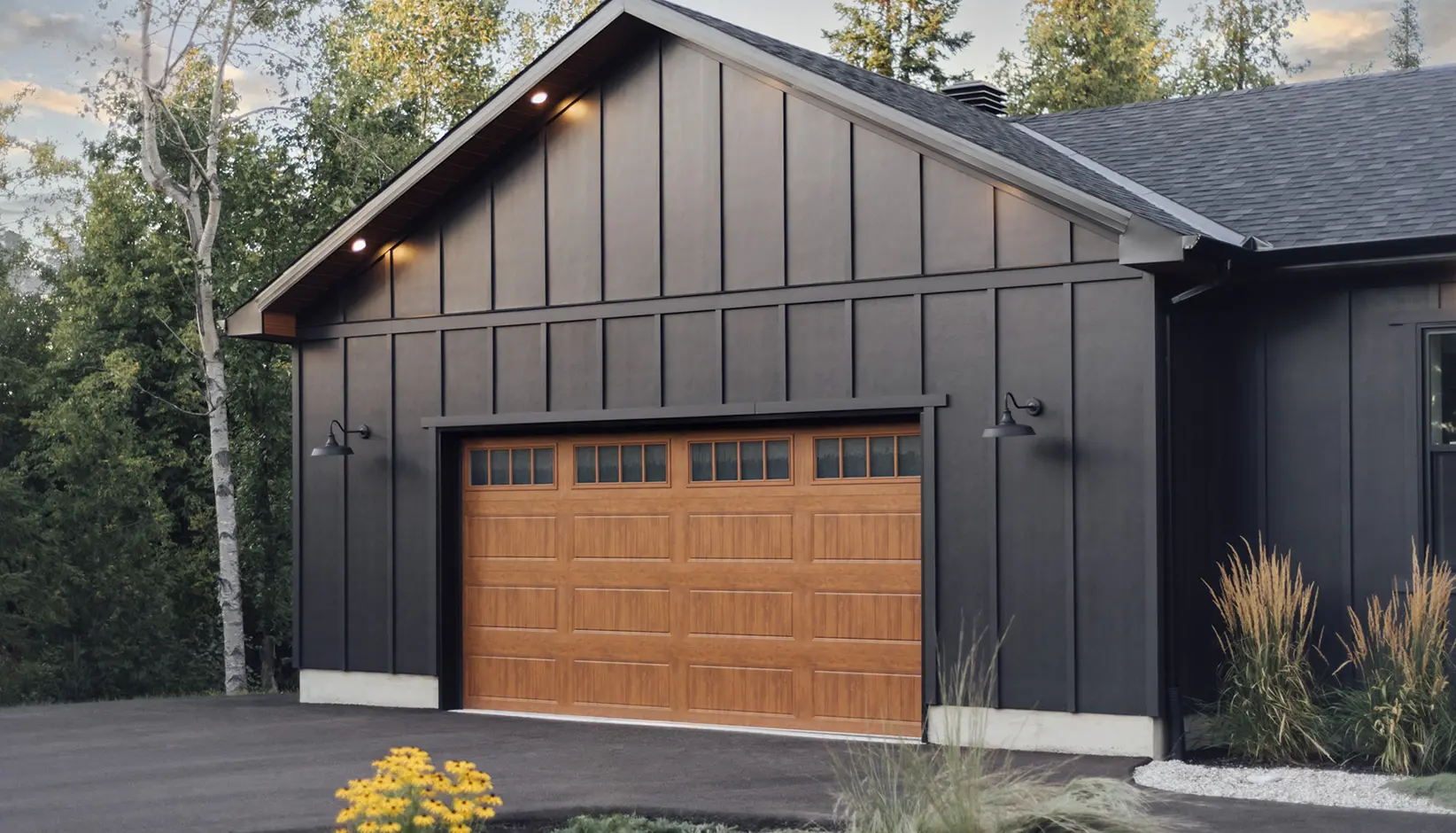
Gallery® Steel garage door
Pros of Steel Garage Doors
- Durability and Strength: Steel garage doors are built to withstand everyday wear and tear, holding up well against wind, impacts, and frequent use.
- Affordability: Compared to other garage door materials, steel usually offers the best value for the price, making it a solid choice for homeowners on a budget.
- Low Maintenance: With factory-applied finishes, steel doors require very little upkeep. An occasional wash and periodic checks for scratches or dents are usually enough.
- Security: The sturdy construction adds a level of security, making it harder for intruders to break through.
- Variety of Styles and Colors: From wood-look finishes to bold, modern colors, steel doors are available in a wide range of designs. There’s something to suit almost any architectural style.
Cons of Steel Garage Doors
- Susceptibility to Rust: In humid or coastal areas, steel doors can be prone to rust if not properly maintained or if the finish gets scratched.
- Can Dent Easily: While strong overall, steel can dent from impacts—think stray basketballs or hailstorms.
- May Not Be as Aesthetically Appealing: Some homeowners prefer the warmth and texture of wood or the sleek look of glass, which steel can sometimes lack.
Climate Considerations
Steel garage doors work well in most climates. In coastal regions, it’s wise to look for models with rust protection and to keep up with any touch-ups on the finish.
Cost
Steel is generally the most affordable garage door material, both in upfront costs and long-term maintenance. This makes it an attractive option for those balancing budget and performance.
Steel Garage Doors at Clopay®
Clopay® offers several garage doors featuring steel construction. The Classic™ Steel collection delivers a variety of timeless designs with optional insulation. The Modern Steel™ door is perfect for contemporary homes, while the Gallery® Steel combines carriage house charm with the strength of steel. The Bridgeport™ Steel gives you the symmetry of a traditional stile and rail recessed panel door. These models all provide a range of insulation options, finishes, and customization choices to fit your needs.
Wood Garage Doors
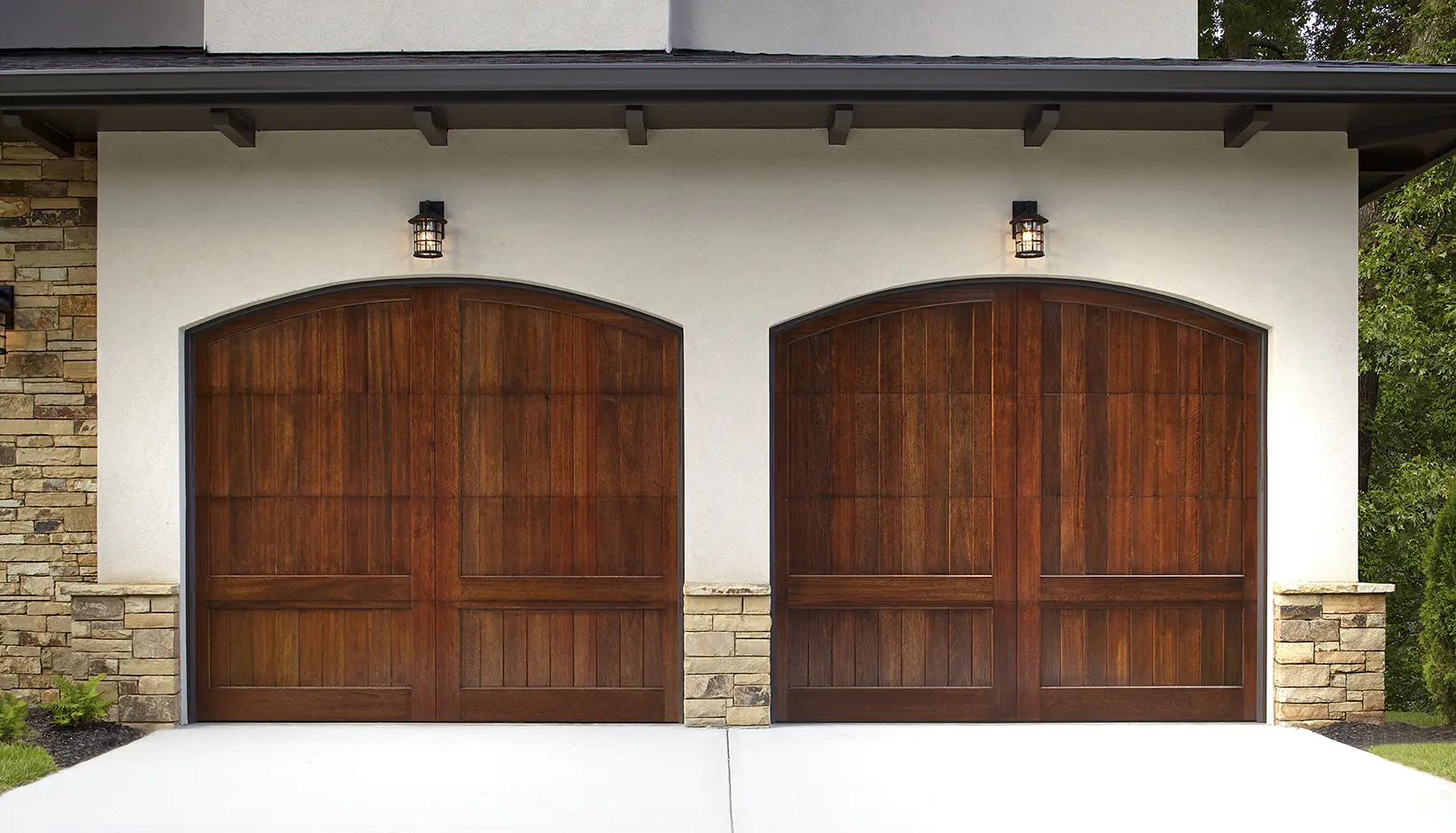
Reserve® Wood Custom garage doors
Wood garage doors are typically constructed from layers of premium hardwoods or engineered wood panels, sometimes built over a sturdy frame for added strength. Common woods include cedar, redwood, and mahogany, known for their durability and distinctive grain. These doors can be crafted in a range of styles, from classic carriage house looks to sleek, modern designs, and are often custom-built to match a home’s architecture.
Pros of Wood Garage Doors
- Natural Beauty and Warmth
Wood offers a richness and authenticity that’s hard to replicate. The grain, color variations, and texture give wood garage doors a unique character that stands out. - Customizable Designs
Homeowners can personalize everything from the type of wood to the panel layout, windows, hardware, and finishes. Wood is perfect for one-of-a-kind designs or historical replicas. - Insulation Properties
Wood is naturally insulating, helping to regulate temperature in the garage—an advantage in both hot and cold weather.
Cons of Wood Garage Doors
- High Maintenance
To keep a wood garage door looking good and protected from the elements, regular painting or staining is a must. Neglect leads to fading, peeling, or worse. - Susceptible to Rot, Warping, and Insect Damage
Moisture and pests can take a toll. Without proper care, wood is vulnerable to rot, warping, and termite damage. - Higher Cost
Between the materials and the labor, wood garage doors are usually at the top end of the price range.
Climate Considerations
Wood garage doors are best for moderate climates with low humidity. In areas with harsh winters, humid summers, or lots of rain, extra protective finishes and more frequent maintenance are needed to prevent damage.
Cost
Expect wood to be the most expensive garage door material, both for the initial purchase and for ongoing upkeep.
Wood Garage Doors at Clopay®
Clopay’s wood garage doors are handcrafted in the U.S.A. from sustainably sourced or naturally fallen wood, making each door unique. Homeowners can choose from a variety of species—including tropical Luan, Cedar, Redwood, and reclaimed wood for a rustic touch. Finishes range from classic painted white to rich natural stains, with custom paint options available for the perfect match.
The wood garage door options at Clopay® include the Classic™ Wood which features traditional raised, recessed, and flush panel designs. The Reserve® Wood Modern door gives you clean lines and lets you mix materials to create a unique contemporary look. And if you have a custom design in mind, Clopay can build your dream door from a sketch!
Aluminum Garage Doors
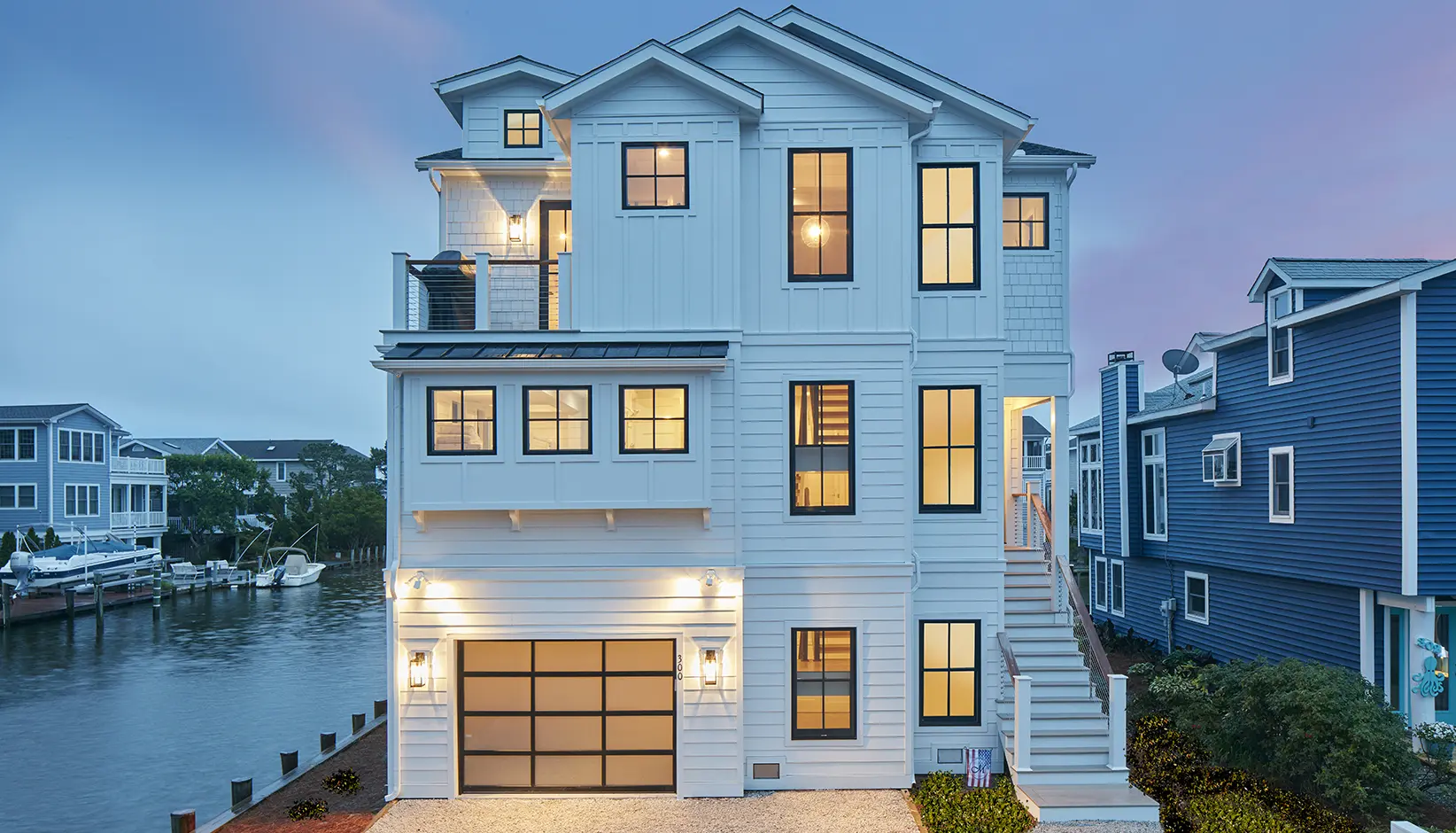
Avante® garage door
Aluminum garage doors are constructed with lightweight aluminum frames and, often, large glass panels for a contemporary look. The frames can be powder-coated in a variety of finishes, and the glass can be frosted, tinted, or clear. This combination gives aluminum doors a clean, modern appearance and makes them easy to operate.
Pros of Aluminum Garage Doors
- Lightweight and Rust-Resistant
Aluminum is much lighter than steel and naturally resists rust, making it easier to lift and a smart option for damp or coastal climates. - Modern and Sleek Appearance
With slim frames and glass panels, aluminum garage doors have a streamlined, contemporary look that pairs well with modern architecture. - Recyclable
Aluminum is one of the most recyclable building materials, making these doors an eco-friendly choice.
Cons of Aluminum Garage Doors
- Less Durable than Steel
Aluminum is softer than steel, so it’s more susceptible to dents and dings from impacts. - Can Dent Easily
Everyday bumps or hail can leave marks, especially on thinner panels. - Limited Insulation Value
Unless insulated, aluminum offers little resistance to heat or cold, which can be a drawback in extreme temperatures.
Climate Considerations
Aluminum garage doors are ideal for coastal areas or humid climates because they won’t rust. In colder regions, however, they may not provide enough insulation to keep out the cold.
Cost
Aluminum garage doors fall in the mid-range for price—typically more expensive than basic steel doors but less than custom wood options.
Aluminum and Glass Garage Doors at Clopay®
Clopay’s Avante®, Avante® Sleek, and VertiStack® Avante® garage doors feature sleek aluminum and glass designs that will make your house the talk of the neighborhood. These doors have a number of design options (including vertical stacking above the door opening) and are perfect for modern homes.
Composite (Faux Wood) Garage Doors
Composite garage doors, often called faux wood garage doors, are typically built with a sturdy wood or steel frame and a composite overlay that mimics the look of real wood. The composite material is engineered to resist moisture, rot, and insects, while offering the beauty of natural wood grain. Many models come with built-in insulation for added energy efficiency.
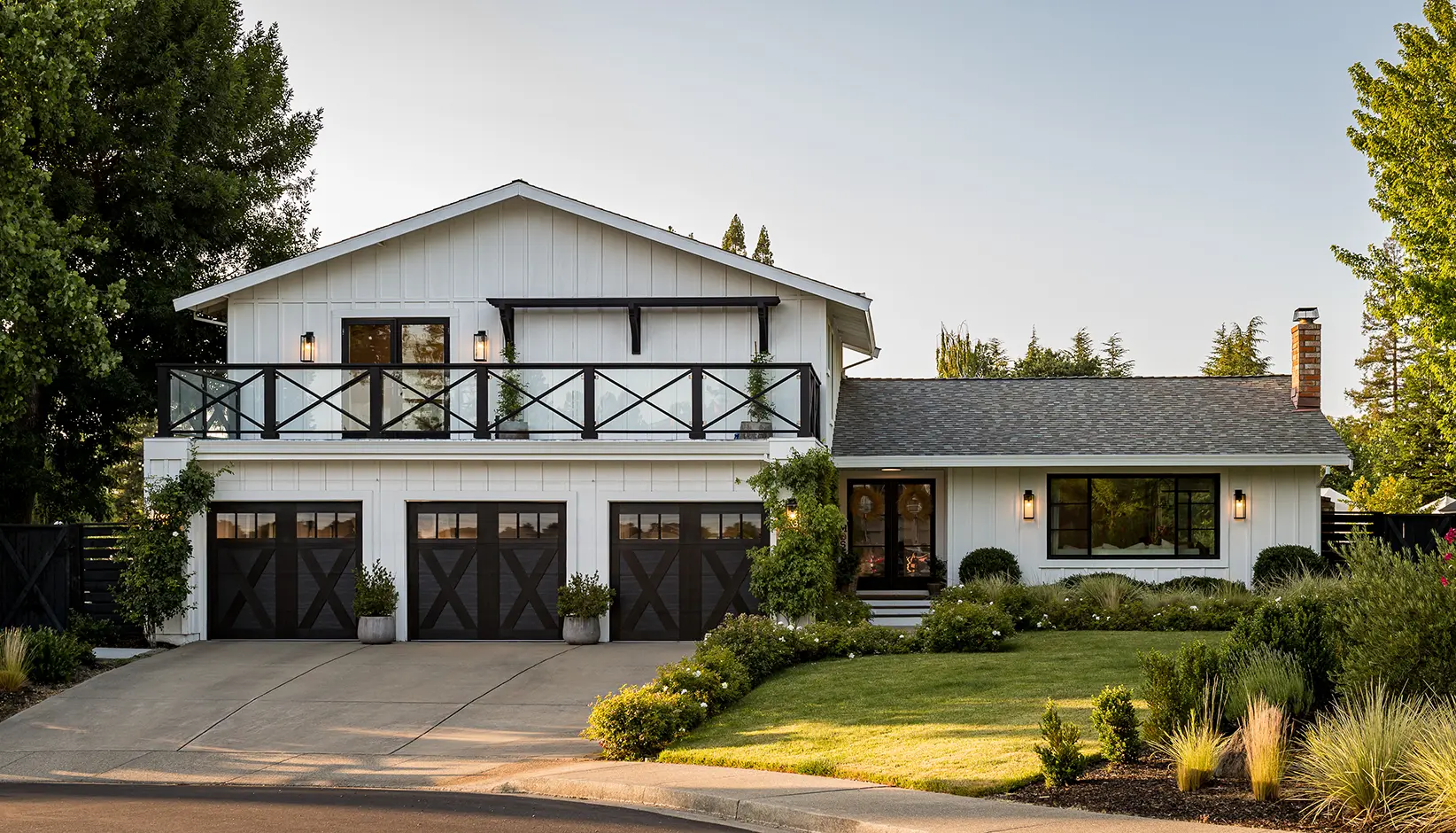
Canyon Ridge® 4-Layer carriage house garage door
Pros of Composite Garage Doors
- Durability and Weather Resistance: Composite doors are built to withstand harsh weather, moisture, and pests, without the risk of warping or rotting.
- Low Maintenance: They require very little upkeep—just the occasional cleaning—since the composite overlay doesn’t need to be repainted or stained.
- Realistic Wood Appearance: High-quality composite doors capture the look and texture of real wood, often fooling the eye from a distance.
- Insulation Properties: Many composite doors are insulated, helping to regulate the temperature inside the garage and improve energy efficiency.
Cons of Composite Garage Doors
- Can Be More Expensive than Steel: Composite doors usually cost more than standard steel but are still less pricey than custom wood options.
- May Not Be as Customizable as Wood: While available in a variety of finishes and designs, composite doors don’t offer the full range of custom options that real wood allows.
Climate Considerations
Composite garage doors are suitable for all climates thanks to their moisture and weather resistance. They’re a smart pick for regions with extreme temperature shifts, humidity, or frequent storms.
Cost
Expect composite doors to fall in the mid- to high-range for price, reflecting their advanced construction and low maintenance.
Composite (Faux Wood) Garage Doors at Clopay®
Some of the composite doors include the Canyon Ridge® Carriage House 5-Layer garage doors feature a steel core for strength and Intellicore® polyurethane insulation, topped with a molded composite overlay that delivers the look of real wood without the upkeep. The Grand Harbor® is a great carriage house style option that’s budget friendly. And the Reserve® Wood Extira® is an eco-friendly, paint-grade wood composite on a Hemlock wood frame.
Comparison Chart
| Material | Durability | Maintenance | Cost | Climate Suitability | Insulation |
|---|---|---|---|---|---|
| Steel | High (can dent) | Low | $ (Affordable) | Most climates; rust protection in coastal | Good with insulation options |
| Wood | Moderate (requires upkeep) | High | $$$ (Expensive) | Best in moderate, low-humidity climates | Good (naturally insulating) |
| Aluminum | Moderate (can dent) | Low | $$ (Mid-range) | Limited unless insulated | |
| Composite (Faux Wood) | High | Low | $$–$$$ (Mid-high) | All climates (weather-resistant) | Good (often insulated) |
Choosing the Right Garage Door Material for Your Climate
Coastal Climates
Aluminum and composite doors are ideal—they resist rust and moisture, making them perfect for salty, humid air.
Cold Climates
Steel or composite doors with high insulation values help keep the cold out and energy costs down.
Hot Climates
Steel or aluminum doors with light, reflective finishes perform best, helping to keep your garage cooler in intense heat.
Moderate Climates
All materials work well. Focus on what matters most to you—look, upkeep, or budget—since you have the most flexibility.
Choosing the Right Garage Door Material for Your Budget
Affordable
Steel garage doors are the best pick for homeowners watching their spending. They’re durable, low maintenance, and available in many styles, all at a wallet-friendly price.
Mid-Range
Aluminum and composite garage doors are solid choices if you have a bit more to spend. Aluminum offers a modern look and rust resistance, while composite delivers the look of wood with less upkeep and good insulation.
High-End
For those seeking a premium, custom look, wood garage doors stand out. They’re the most expensive option but offer unmatched beauty and design flexibility.
Other Considerations
Aesthetics
Choose a material that matches your home’s style. Wood and composite offer classic, natural looks, while steel and aluminum work well for modern designs.
Maintenance
Steel, aluminum, and composite doors need very little upkeep. Wood doors look great but require regular painting or staining to stay protected.
Insulation
If comfort and energy efficiency matter, look for insulated doors—especially in extreme climates. Composite and steel doors often provide the best options, while wood is naturally insulating.
Frequently Asked Questions
What is the most durable garage door material?
Steel and composite (faux wood) garage doors are among the most durable options. Steel is strong and long-lasting, while composite doors resist moisture, rot, and insects for excellent durability.
What is the best garage door material for a coastal climate?
Aluminum and composite doors are the top choices for coastal areas. Both resist rust and moisture, making them ideal for salty, humid environments.
What is the best garage door for hot weather?
Steel or aluminum doors with light, reflective finishes help keep your garage cooler in hot climates. Aluminum is especially good at resisting sun damage and warping.
What is the best garage door for cold weather?
Steel or composite doors with high insulation values are best for cold climates. They help keep out the cold and improve your home’s energy efficiency.
Choosing the right garage door material makes a real difference in comfort, style, and long-term value. Take time to think about your climate, budget, and what look works best for your home. When you’re ready to take the next step, find a Clopay dealer near you, request a quote, or start designing your perfect garage door today.
Helpful Articles
How to Choose the Right Garage Door Material

